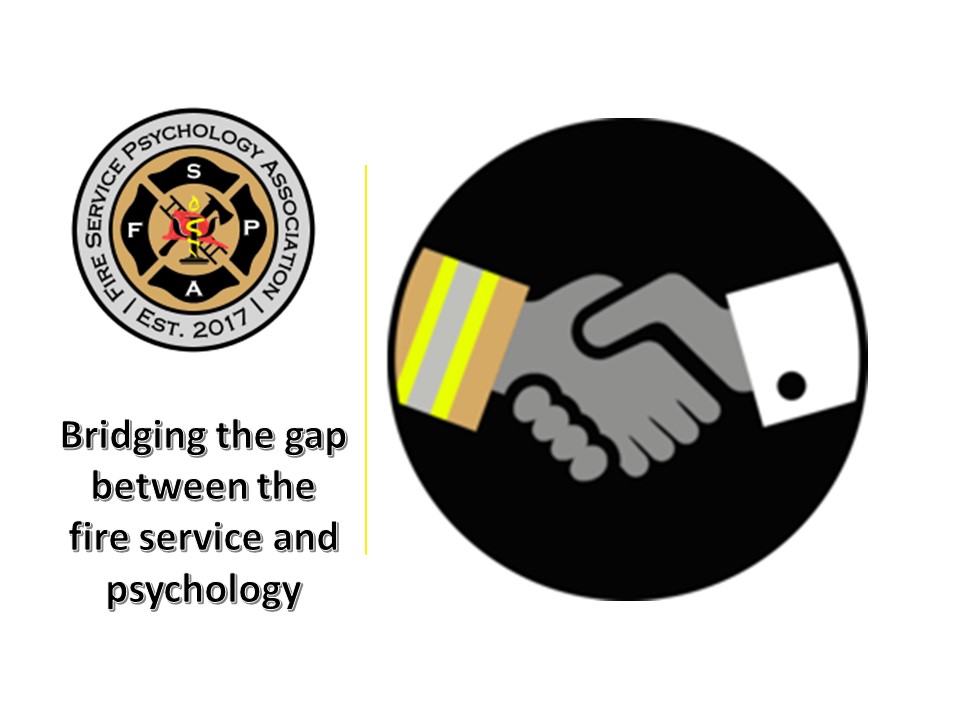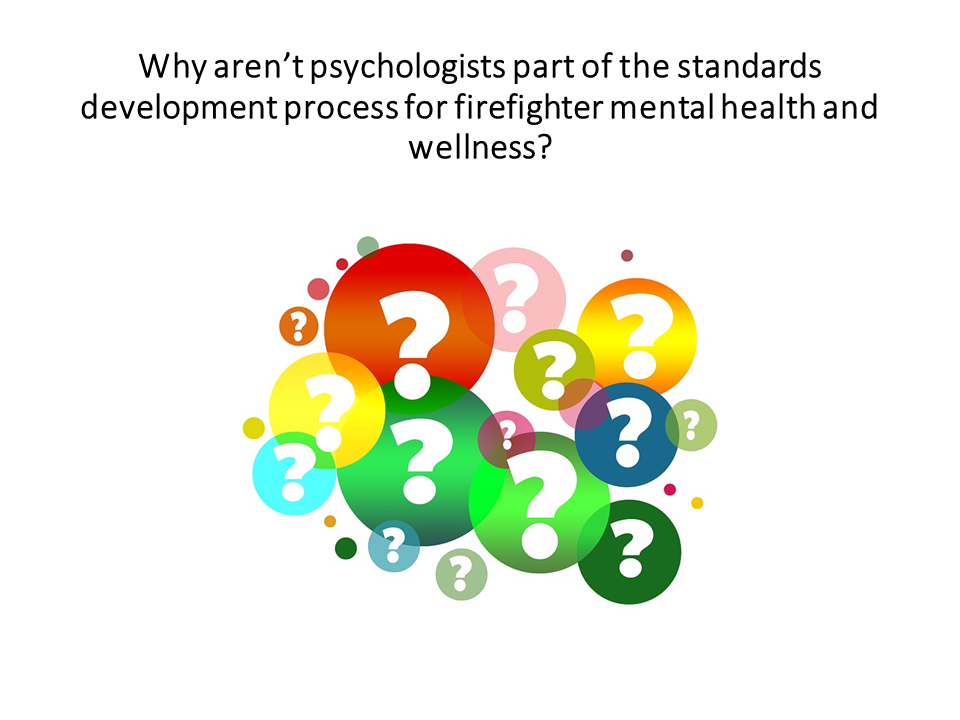By: Robert Avsec, Executive Fire Officer and member of the Fire Service Psychology Association
And neither should psychologists, licensed clinical social workers, fire chiefs, fire commissions, or any of the multitude of bloggers posting their solutions to the behavioral and mental health issues facing firefighters today.
Why not? Because there are many different mental health clinicians who have different levels of education, experience, licensure, and scopes of practice. Why does that matter?
We consider firefighters, fire officers, engineers, hazardous materials technicians and specialists, technical rescue specialists, EMTs, and paramedics all to be first responders, right? But their “scope of practice” and “scope of competency” are all quite different, no? I know I wouldn’t want a hazmat specialist who’s not also a paramedic to be administering patient care to me if I was having a heart attack.
In a Position Paper: Fire Service Psychology, Fire Service Psychology Association (FSPA) founder and president, Kristen Wheldon, lays out what fire service leaders and mental health practitioners must work together on to create a Fire Service Psychology discipline.
The following is an excerpt from another white paper, Clinician Training: Fire Service Cultural Competency Training Program, that I co-authored with Dr. Kristen Wheldon, Dr. Burton A. Clark, Dr. Zachary Isoma.
Mental Health Licenses and Scopes of Practice
Mental health clinicians are identified using different titles. These titles reflect different
levels of education, experience, licensure, and scopes of practice. Consumers need to understand
these titles and appreciate what types of services the provider can offer. Clients should also be
aware that each state utilizes different governing bodies to regulate licenses and the delivery of
mental health services and to protect consumers of these services.
It is essential for firefighters and fire service agencies who utilize mental health professionals to be educated about these factors before deciding which clinicians to use personally and professionally. This white paper references the California Department of Consumer Affairs Guide to Healthcare Providers as
one state-specific example of the concept.
The scope of practice describes what mental health providers can do if they gain the
proper competencies to fulfill those functions. Scope of competence limits a practice because
although a provider may have the primary education for licensure, not all providers have the
additional training, supervision, and experience to provide specialty care.
For example, psychologists are authorized to conduct pre-employment screenings (scope of practice), but not all psychologists have that competency (scope of competence.) Students can work under a mental health clinician’s license with that professional’s approval. However, licensed clinicians can only supervise students seeking licensure at a level commensurate with
the license the supervisors hold or below that standard. For example, The Board of Behavioral Sciences and Board of psychology outline specific guidelines for this practice. Psychiatrists and
Psychologists can oversee Board of Behavioral Science students because those license types
have a larger scope of practice.
Mental Health Clinician Designations
Psychiatrists are physicians who specialize in preventing, diagnosing, and treating mental
disorders. They work in private practice, hospitals, clinics, and the common services based on
their scope of practice include research, direct therapy services, and prescription privileges. To
obtain a psychiatrist certification, an individual must earn a Doctorate Degree (M.D.), complete a
required number of supervision hours, pass a National Examination, and pass a State
Examination for the state they wish to practice in.
Psychologists work in hospitals, clinics, counseling centers, or private practice. They
provide individual, family, or group psychotherapy and design and implement behavior
modification programs. Standard services a psychologist may offer are based on their scope of
practice. They may include research, psychological testing (e.g., fitness for duty and
pre-employment), direct psychological services, as well as the creation, maintenance, and
effectiveness testing of behavioral health programs. The domains in which they offer services
include assessment, operational support, management consultation, and clinical intervention.
Psychologists must earn a doctorate degree (Ph.D. or Psy.D.) and complete the required
supervision hours. They must also fulfill a research requirement (many programs require the
completion of a dissertation or research in the field). They pass a national examination testing
their understanding of the field’s underlying principles and a state examination to ensure their
understanding of the specific laws and regulations for the state in which they practice.
Marriage and Family Therapists (MFT) work in clinics, counseling centers, and private
practice. They use counseling or psychotherapeutic techniques to assist individuals, couples,
families, and groups with marriage, family, and relationship issues. Standard services based on
an MFT’s scope of practice include therapy services.
An MFT must earn a master’s degree, complete a required number of supervision hours, pass a national examination, and pass the state examination for the state they wish to practice in. In California, per the Business and Professional Code, they cannot hold themselves out as psychologists even if they have a doctoral degree in psychology. The license determines appropriate representation.
Licensed Clinical Social Workers (LCSW) work in health facilities, private practices, and
child welfare agencies. They use counseling and psychotherapeutic techniques to assist
individuals, couples, families, and groups. They often refer clients to specific resources to
improve their quality of life. An LCSW’s standard services based on the scope of practice
include therapy services. An LCSW must earn a master’s degree, complete a required number of
supervision hours, pass a national examination, and pass a state examination for the state they
wish to practice in.
Educational Psychologists (EP) work in schools or private practice and provide
educational assessment and counseling relating to academic ability, behavior, and other matters
based on their scope of practice. An EP must earn a master’s degree, complete a required number
of supervision hours, pass a national examination, and pass a State Examination for the state they
wish to practice in.
Professional Clinical Counselors (PCC) use counseling interventions and
psychotherapeutic techniques to treat cognitive, mental, and emotional issues, including personal
growth, adjustment to disability, crisis intervention, and psychosocial and environmental
problems based on their scope of practice. To become a PCC, an individual must earn a Master’s
Degree, complete a required number of supervision hours, pass a National Examination, and pass
a State Examination for the state they wish to practice in.
And that’s why we need to have a field of Fire Psychology that’s been developed using fire service leaders and mental health practitioners of all “shapes and sizes” if we are to develop and implement better mental health programs for fire service personnel.
 Fire & EMS Leader Pro The job of old firefighters is to teach young firefighters how to become old firefighters!
Fire & EMS Leader Pro The job of old firefighters is to teach young firefighters how to become old firefighters!


